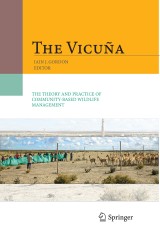Details

The Vicuña
The Theory and Practice of Community Based Wildlife Management|
CHF 118.00 |
|
| Verlag: | Springer |
| Format: | |
| Veröffentl.: | 13.01.2009 |
| ISBN/EAN: | 9780387094762 |
| Sprache: | englisch |
| Anzahl Seiten: | 256 |
Dieses eBook enthält ein Wasserzeichen.
Beschreibungen
Things have changed. In 1969 when the Convention for the Conservation of the Vicuña was drafted, in an attempt to save the vicuña from its tumbling decline towards extinction, both the science and the philosophy of wildlife conservation were radically different. It is thus a tribute to the prescience of those involved at the time that the rescue plan had, even through the harsh lens of hindsight, a d- tinctly Twenty First Century flavour. After all, it was predicated on the expectation that if vicuña could be saved, they would one day become a valued asset, generating revenue for the human communities that fostered their survival. Embodied in this aspiration are the main structures of modern biodiversity conservation – not only is it to be underpinned by science, but that science should be of both the natural and the social genres, woven into inter-disciplinarity, and thereby taking heed of e- nomics, governance, ownership and the like, alongside biology. In addition, it should include, as a major strut, the human dimension, taking account of the affected constituencies with their varied stakes in alternative outcomes. This c- temporary framework for thinking about biodiversity conservation is inseparable from such wider, and inherently political, notions as community-based conser- tion and ultimately sustainable use.
The Philosophy of Sustainable Wildlife Use.- The Historical Relationship Between People and the Vicuña.- The Vicuña in the Andean Altiplano.- Sociality, Foraging and Habitat Use by Vicuña.- Animal Welfare and the Sustainable Use of the Vicuña.- International Policies and National Legislation Concerning Vicuña Conservation and Exploitation.- Local Participation in Vicuña Management.- Environmental Education as a Tool in the Sustainable Management of Vicuña in the Altiplano of South America.- Lessons for the Future of Sustainable Use of Vicuña.
<P>Iain Gordon leads the Healthy Terrestrial Ecosystems Theme in CSIRO’s Sustainable Ecosystems Division; he is based in Townsville and is heads up CSIRO’s Davies Laboratory (over 85 staff and students) that focuses on a whole-of-systems approach to natural resource management in the tropics of northern Australia. Iain holds professorships at Royal Melbourne Institute of Technology University, James Cook University, University of Queensland and the University of Aberdeen. Iain has a BSc Hons in Zoology from the University of Aberdeen, a PhD from Cambridge and has spent over 25 years working on the impact of agriculture on ecosystems and biodiversity in Europe and Australia. He has also led a number of multidisciplinary projects on community-based wildlife management in Asia, Africa and South America. Currently Iain sits on the editorial boards for 6 international scientific journals and is on the scientific advisory committees for the Great Barrier Reef Marine Park Authority and the Australian Wet Tropics Management Authority. His published works include over 150 refereed publications and book chapters. His work has been cited over 2500 times at an average of over 105 times per year. Springer has recently published a book he edited on the ecology of large mammalian herbivores and how this will be affected by climate change. </P>
<P>The vicuña has been one of the few success stories of wildlife conservation. Increasing populations are, however, raising new challenges for effective management as emphasis shifts from protection to allow sustainable use. Internationally, policy development has followed the community-based conservation paradigm, which holds that economic benefits from wildlife management practices bring greater commitment on the part of local communities to protect both the species and its habitat. In this book we argue that sustainability is not guaranteed by sustainable use, and that both education and regulation are required to prevent the proliferation of unsustainable practices. Community wildlife management does not replace conservation, but it does fundamentally alter the nature of the task that conservation agencies face. </P>
Most books on this species are in Spanish There is a strong South American market for this title
Diese Produkte könnten Sie auch interessieren:

Saving Biological Diversity

von: Robert A. Askins, Glenn D. Dreyer, Gerald R. Visgilio, Diana M. Whitelaw

CHF 118.00

Martens and Fishers (Martes) in Human-Altered Environments

von: Daniel J. Harrison, Angela K. Fuller, Gilbert Proulx

CHF 177.00














